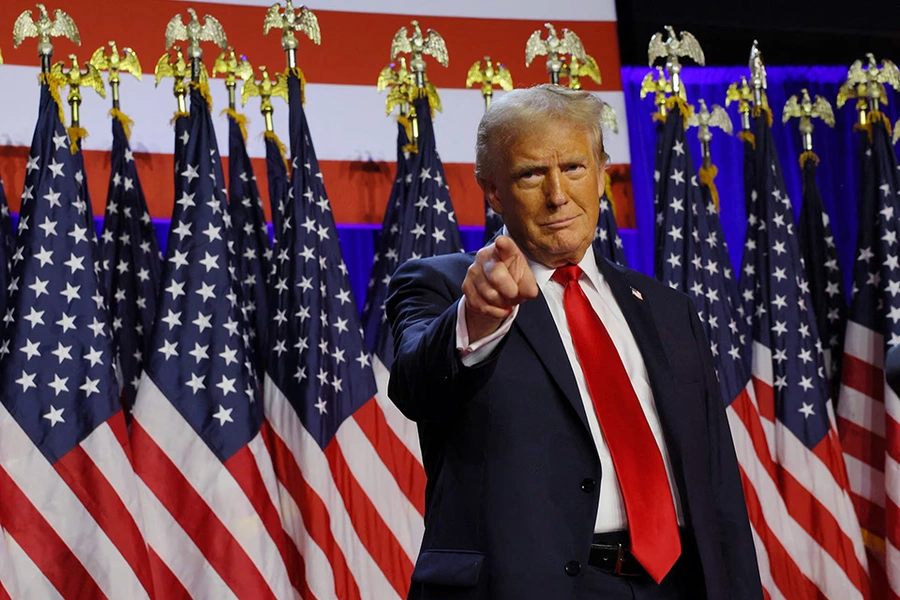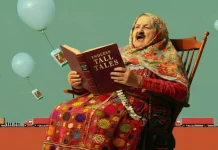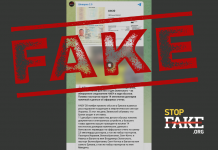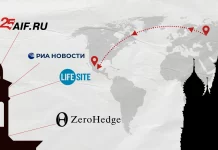Observing the reaction of the Kremlin’s propaganda centers, one can see that they are officially exercising some restraint over the election of Donald Trump as President of the United States. This is despite the fact that Russia actively supported the candidacy, and enthusiasm erupted in the local social media on the news of the Republican candidate’s win. Why is this happening?
Undoubtedly, Russia supported Donald Trump in the presidential election. It did so both through official declarations and in the unofficial sphere. The candidate was seen as coveted by the pro-Kremlin media. Russian troll farms also acted in her favor. This applies both directly and indirectly to the creation of an atmosphere favorable to his election as US president. They were the ones behind, for example, the spreading of false accusations on the Internet against Democratic vice-presidential candidate Tim Walz. The Russian group Wired, on the other hand, is responsible for spreading rumors that Kamala Harris allegedly caused a traffic accident a dozen years ago and drove off without helping the victims. In the case of indirect propaganda, in turn, a sizable role was played by the formation of isolationist sentiments in American society and the spread of various conspiracy theories that undermine confidence in the incumbent government and the establishment. Moscow’s interference in the U.S. election was, in fact, confirmed by Nikolai Patrushev, a former member of Russia’s Security Council and one of the most influential people in the Kremlin, saying that “Trump benefited from certain forces.”
Since Moscow undoubtedly “gambled” on Trump’s candidacy, why the official restraint of Russian official factors, even standing in contrast to the enthusiastic reactions evident on Russian online forums? Although Putin congratulated Trump on his election, he did so only through unofficial channels. Official statements do show a certain mood of optimism, but it is quite cautious, often toned down and far from at least that shown by some right-wing groups in Poland. This can also be seen in the pro-Kremlin media. On the one hand, there are clearly pro-Trump comments there, and almost every announced appointment in the incoming administration is met with overwhelming approval. This is especially true of those who have a record of making pro-Russian statements or opposing aid to Ukraine. On the other hand, the Russian press does not shy away from quoting Western media comments stating that the new U.S. president may turn out to be more anti-Moscow even than his predecessor.
What is the reason for such official restraint? Mainly from the unpredictability of Trump himself, which was already evident during his previous term. Admittedly, he promises to bring a quick end to the war in Ukraine, which in the current situation seems more favorable to Putin, who would most likely keep at least most, if not all, of his previous territorial gains and gain time to prepare for another invasion of Kyiv in a few years. On the other hand, Trump is creating himself as a strong, decisive leader. The Kremlin’s reluctance to make any concessions could lead to a sharp turnaround in the policies of the current president-elect, and unprecedented American aid, much larger than the “drip feed” disbursed by the Biden administration, will begin to flow to Ukraine, while the United States will tighten sanctions and decide to confiscate any frozen Russian assets. As the expert on combating Russian disinformation, Mikhail Marek, notes, the official caution of the Russian government is related to the fear of how to explain to its own people in such a situation that a “friend of Russia” in propaganda has suddenly turned into an anti-Kremlin “warmonger.”
But there is also a view among some commentators that Russian support for Trump’s candidacy is linked not only to current goals, i.e. bringing victory in Ukraine, but also to the Kremlin’s long-term aspirations. And fundamental among them is the joining of Russia as an equal partner in the “concert of powers.” This is only possible if the international position of the US is weakened and the relative unity of the West is shattered. The way to the former may seem to be increasing polarization of American society and concentration of the White House exclusively on domestic affairs. The fulfillment of these Russian hopes seems much closer under Trump’s stirring government than under the Democrats, as does the potential conflation of the United States with some European Union countries, if only on the basis of US protectionist economic policies. But on the other hand, Kremlin politicians should take into account Trump’s volatility. For it may turn out that his second presidency will be marked by a more decisive foreign policy, not only in the Pacific zone, and unfavorable for Russia to build a strong eastern flank of NATO. Following Russian propaganda, one can see the election of Donald Trump raises both hope and fear in the Kremlin. Hope for an end to the war in Ukraine on Russian terms, as well as the ongoing internal erosion of the US and the “collective West.” Fears, on the other hand, relate to the possible strengthening of Ukraine and increased US activity around the world. Time will tell which of these scenarios will come true, as the nature of the future occupant of the White House makes it impossible to bet decisively on any of them for now.
Photo: Reuters





